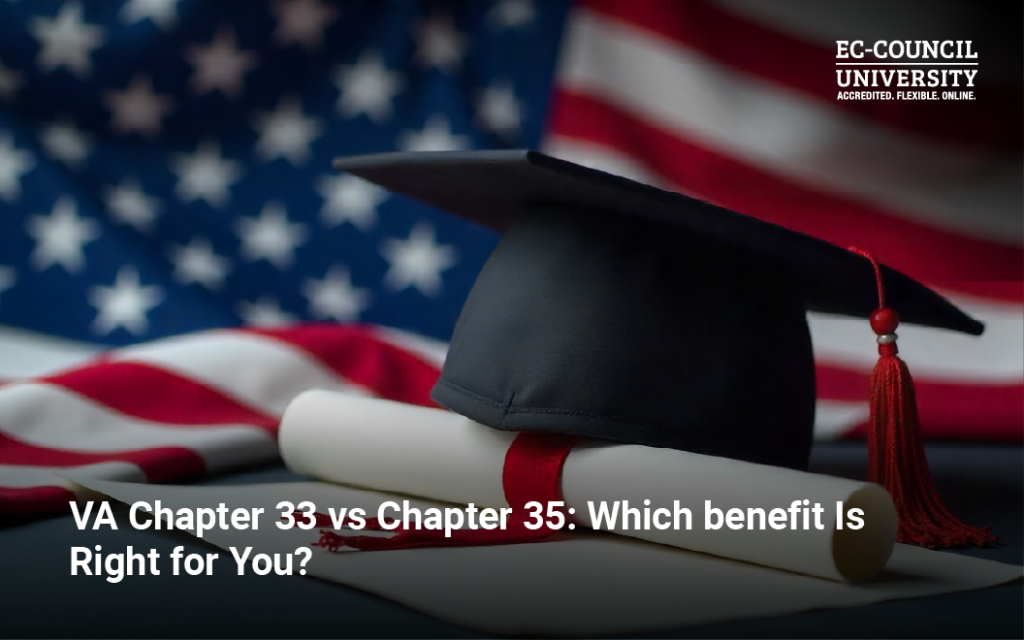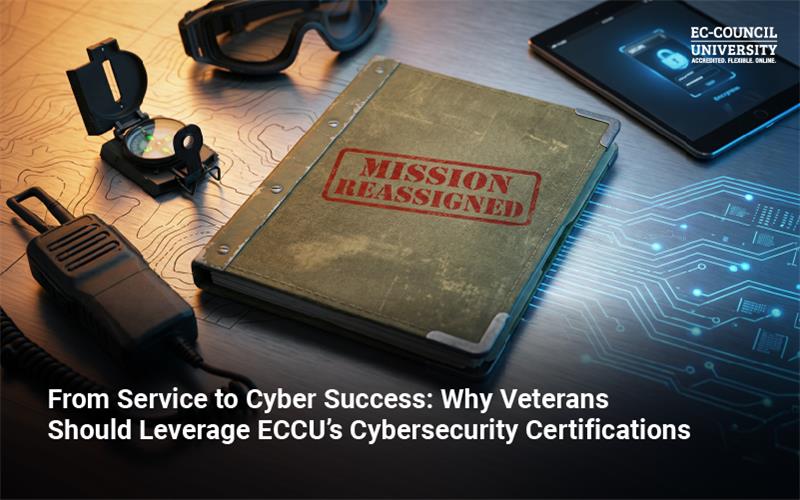Navigating the world of VA education benefits can feel like a maze, especially when weighing Chapter 33 and Chapter 35 VA education benefits. Both the VA benefits serve a very different audience and meet different needs, but which is applicable and right for you? Let us break down Chapter 33 VA benefits and Chapter 35 VA benefits, compare them head‑to‑head, and help you decide which path makes the most sense.
What Is Chapter 33 VA Benefit?
Chapter 33, which is also known as the Post‑9/11 GI Bill®, is designed primarily for veterans or service members who served on active duty on or after September 11, 2001.
Eligibility for Chapter 33 depends on your active-duty service. Here is what Chapter 33 eligibility criteria include:
At least one of these criteria must be met to qualify for education benefits.
- You served for at least 90 days of active duty on or after September 11, 2001, or
- You received a Purple Heart on or after September 11, 2001, and were honorably discharged after any length of service, or
- You served at least 30 continuous days of active duty (without a break in service) on or after September 11, 2001, and were honorably discharged due to a service-connected disability, or
- You are a dependent child using benefits transferred by an eligible Veteran or service member.
- You are a reserve member who lost education benefits when REAP ended in November 2015, may be eligible to have those benefits restored under the Post-9/11 GI Bill®.
Here is what Chapter 33 offers:
- Tuition and fees: If you qualify for maximum benefit, you may have the full cost of public in-state tuition and fees covered. Rates for private and foreign schools are capped and updated each year.
- Housing allowance: If you are enrolled for more than half-time, your monthly housing allowance will be based on the cost of living where your school is located.
- Books and supplies: You may receive up to the maximum yearly stipend for books and supplies.
- Tutorial assistance: You may receive help with your tutor fee.
- National exams: You may be reimbursed for the cost of approved national tests.
- Licensing, certification tests, and prep courses: You may be reimbursed for approved licensing or certification exams and qualifying prep courses.
- Work-study: You may also earn money through the work-study program while being enrolled in an eligible college, vocational school, or training program.
- Rural relocation assistance: You may qualify for a one-time payment for relocating from a rural area for your schooling.
What Is Chapter 35 VA Benefits?
Chapter 35, also called Dependents’ Educational Assistance, or DEA, is not for veterans themselves, but for their dependents. That means the VA benefit is applicable to spouses or children of veterans who are permanently and totally disabled due to a service‑connected disability, or who died in service or from such a disability.
Eligibility for Chapter 33 depends on whether both you and the Veteran or service member meet specific eligibility requirements.
At least one of these criteria must be met to qualify for education benefits.
- The Veteran is permanently and 100% disabled due to a service-related disability, or
- The Veteran died due to a service-related disability, or
- The service member died in the line of duty, o
- The service member is missing or was captured in the line of duty for more than 90 days, or
- The service member was forcibly detained or interned in the line of duty by a foreign entity for more than 90 days,
- The service member is in the hospital or receiving outpatient treatment for a service-related permanent, 100% disability and may likely be discharged due to that disability.
Here is what the eligibility criteria include for you as the dependent:
If you are the child of the eligible veteran or service member:
- You may be married or unmarried.
- If you join the military, you cannot use this benefit while on active duty. You may use this benefit after you leave the service, but you cannot have a dishonorable discharge.
- If you are entitled to receive the Dependency and Indemnity Compensation (DIC) benefit, you may have to give up those payments when you start using the DEA.
If you are the spouse of the eligible veteran or service member:
- You may be eligible to receive both DEA and VA Dependency and Indemnity Compensation (DIC) payments if you meet the criteria.
- If you get divorced, you may no longer be eligible for DEA benefits.
- If you join the military, you cannot use this benefit while you are on active duty. You can only use this benefit after you leave the service, but in that case you should not have dishonorable discharge.
- If the Veteran dies and you remarry, you may no longer be eligible to receive the DEA benefits that you had earlier qualified for through the eligible Veteran. However, there are two exceptions listed here.
- If you remarry after the Veteran dies, your remaining DEA benefits may be restored under the following your situation:
- Your new marriage was on or after January 1, 2004, and you are at least 57 years old, or
- Your new marriage ends due to death or divorce
Here is what the VA Chapter 35 benefits cover:
- College Degrees: You may be eligible for financial support for undergraduate and graduate degree programs.
- Tutorial Assistance: You may be eligible for payment for tutorial assistance.
- National Tests and Prep courses: May cover reimbursement for national exams and approved test prep.
- Vocational/technical/non-degree training: You may be eligible to receive funds for vocational, technical, and other non-college training programs.
- Hands-on training: You may receive support for on-the-job training and apprenticeship programs.
- Entrepreneurship training: You may be eligible to receive training to start and manage a business.
- Licensing and certification: You may get payment for approved licensing or certification exams and prep courses.
- Work-study options: You may be qualified for the opportunity to earn money through co-op training or work-study programs.
- Classes from home
- Correspondence training: You may receive support for offline mail-based coursework.
- Independent and distance learning: You may receive support for online or remote learning programs.
Note: Unlike Chapter 33, VA Chapter 35 benefits do not pay your tuition to school; you get a stipend, but you need to handle tuition via other means.
Chapter 33 vs Chapter 35: Key Differences and What May Be Applicable to You?
To make the chapter 33 vs chapter 35 comparison clear, here’s a breakdown of their major differences:
| Feature | Chapter 33 VA Benefits | Chapter 35 VA Benefits |
|---|---|---|
| Beneficiary | Veteran or service member or dependent via transfer | Dependent (spouse or child) of a qualifying veteran |
| Type of Aid | Tuition, fees to school, housing allowance, book stipend | Monthly stipend only; no direct tuition payment |
| Duration | Up to 36 months (or more in certain cases) | Up to 36 months (for many since 2018) |
| Eligibility Window | Based on a veteran’s service, benefits may not expire for some (Forever GI Bill®) | There is an age/time limit for dependents; spouse window, child age limit |
| Payment Structure | Direct to school, monthly housing, stipend | Monthly payment to the dependent based on the course load |
Can You Combine or Sequence Chapter 33 and Chapter 35 Benefits?
- You cannot receive or use both Chapter 33 and Chapter 35 simultaneously for the same enrollment period.
- But in some cases, you may use them one after the other (e.g., use your Chapter 33, then switch to 35, if eligible).
Final Thoughts: Chapter 33 vs 35 VA Benefits — Which Is Right for You?
In the Chapter 33 vs Chapter 35 debate, there is no one-size-fits-all. The right benefit depends heavily on:
- Your status Veteran vs Dependent
- Your education goals (degree, vocational, mission-critical certification)
- Your financial needs (tuition, living costs, books)
- Your eligibility window (service time, age limits, entitlement months)
If you are a Veteran, VA Chapter 33 benefits are often the most powerful tool for funding your education, covering tuition, housing, and other expenses. On the other hand, if you are a spouse or child of a veteran who qualifies, Chapter 35 benefits for dependents can provide crucial monthly support while you train, study, or complete your degree.
Next Steps on How to Apply
Consider the following steps before making the decision
- Apply for a Certificate of Eligibility (COE) to check your specific entitlement.
- Talk to your school’s Veterans Affairs/Certifying Official; they can run the numbers and simulate payments.
- Consider combining benefits (if allowed) or sequencing them carefully.
- Use VA’s GI Bill® comparison tools to calculate your training timeline, school costs, and benefit usage.
Visit VA.gov to submit Form 22-1990 (Chapter 33) or Form 22-5490 (Chapter 35), applying online or with support from your school’s VA certifying official.
Frequently Asked Questions
VA Chapter 33 (Post-9/11 GI Bill) is primarily for veterans, service members, and certain transferees, while Chapter 35 (DEA) is for dependents of veterans who are permanently disabled or deceased due to service. Both the VA benefits differ in eligibility, payment rates, and available educational support.
In most cases, you cannot use both at the same time, and using one may reduce or eliminate eligibility for the other. Always compare your long-term goals and expected benefit amounts before selecting one.
Yes. Eligible dependents may choose either transferred Post-9/11 GI Bill benefits or Chapter 35 benefits. Choosing one may impact or reduce the other, so comparing the total benefit value is essential.
Both VA benefit programs cover:
- College degrees
- Technical and vocational training
- Certificate and licensing programs
- Apprenticeships and on-the-job training
Deciding between Chapter 33 vs Chapter 35 VA benefits, which works best for you, depends on a lot of factors. We recommend you compare:
- Eligibility
- Program length
- Financial benefits
- Education goals
- Whether tuition or housing support is more valuable
If you are a dependent, determining whether transferred Chapter 33 benefits are available can also help guide your decision.







